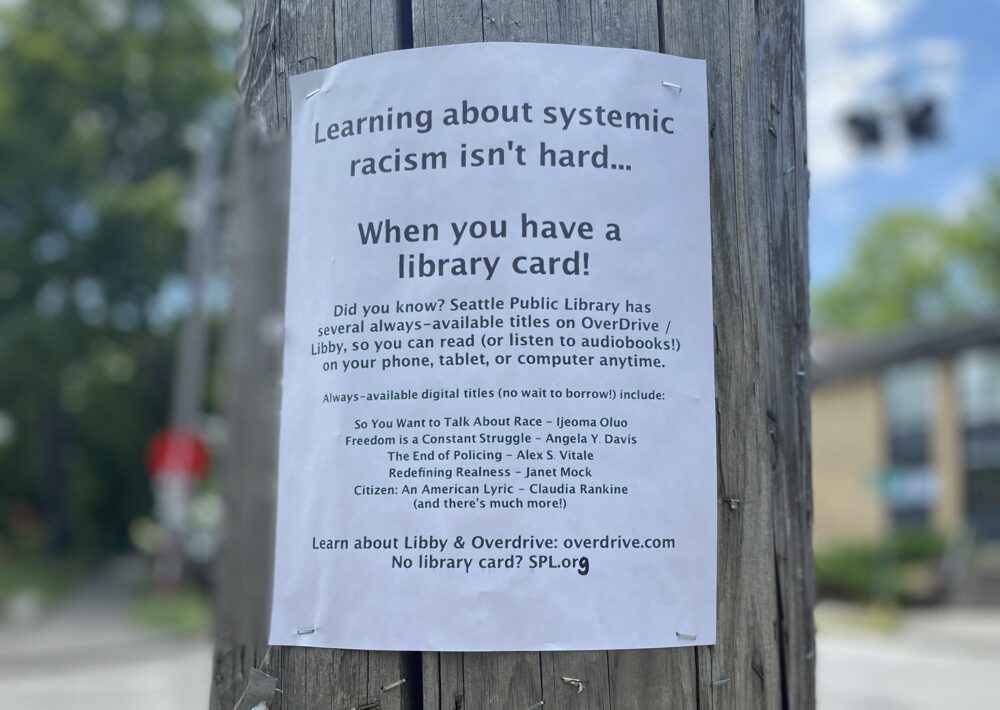
The Monday after nationwide protests first broke out decrying the May death of George Floyd, Frank Brasile found that demand for digital books about race at The Seattle Public Library suddenly skyrocketed.
The Library tries to keep the holds down to five or fewer people for every book. But Brasile, a selection services librarian, found that holds grew to 15 to 1 on a wide array of titles covering race issues—“remarkable demand,” he says.
Brasile immediately sought approval to buy more licenses for digital titles such as “Sister Outsider” by Audra Lorde and “Black Liberation” by Keeanga-Yamahtta Taylor.
“We really want to be able to provide patrons with as much access as possible,” Brasile says.
Demand continued to surge within days, building to 400 holds per day per certain titles, prompting another large acquisition of digital licenses, supported in part by donors to The Seattle Public Library Foundation.
Today, the Library offers more than 30 “always available” titles in its “Reading About Race” collection, offering immediate access to some of the most popular books addressing anti-racism and issues that have historically affected people of color. These include “Me and White Supremacy,” “The End of Policing,” “Ain’t I A Woman,” and “Redefining Realness.”
The “Reading About Race” collection consists almost entirely of e-audiobooks. Because the Library was closed to checking out hard copy books to protect the public from COVID-19, it was limited to acquiring digital materials to build its stock. And publishers tend to offer more generous and accessible licensing for e-audiobooks than for e-books, Brasile says. But by offering these e-audiobooks, people can listen to them immediately and absorb them while driving or doing other activities around the home.
“By having unlimited access, we’re able to meet patrons where the demand is,” Brasile says.
This surge in popularity for these titles highlights a movement in recent years to promote “own voices,” or stories written by people of the very population the subject affects—for example, “The Heartbeat of Wounded Knee” (2019) was an effort by Native American writer David Treuer to reclaim the narrative of indigenous Americans put forth by the white-written “Bury My Heart at Wounded Knee” in 1970.
Last year, Treuer was the Library’s featured speaker at the A. Scott Bullitt Lecture in American History, supported by a Foundation endowment.
Brasile has selected titles for “Reading About Race” written mostly by people of color who can lend their own experience or viewpoints to the issues they spotlight.
“Elevating and amplifying those voices highlights their importance and it puts them on the same level as all of the familiar voices, historians, and writers we know about,” he says.
Patrons have noticed the expanded offerings.
“Y’all I beg you to download the OverDrive app,” college student Alina wrote from her Twitter account. “Seattle Public Library has a bunch of books on race, including audiobooks, that are always available. Including Freedom is a Constant Struggle (read by Angela Davis), Sister Outsider, The New Jim Crow, Citizen. The best free resource.”
OverDrive and Libby are apps patrons can download on their devices to access and check-out digital materials. Alina has listened to at least four of the Reading About Race titles already during her commute to work and plans to check out more.
Another Twitter user spotted a poster near Capitol Hill’s Volunteer Park that read, “Learning about systemic racism isn’t hard…. When you have a library card!” It listed several titles from the “Reading About Race” collection.
“It’s the beginning of what I hope is a sea change, that we’re going to see more diversity in authors, which is going to create a more diverse slate of books that people will read,” Brasile says. “Hopefully it will change people’s minds.”
Find the “Reading About Race” collection at www.spl.org/ReadingAboutRace.
This story appears in the Summer 2020 edition of our newsletter, “The Next Chapter.” Find the full edition here.
